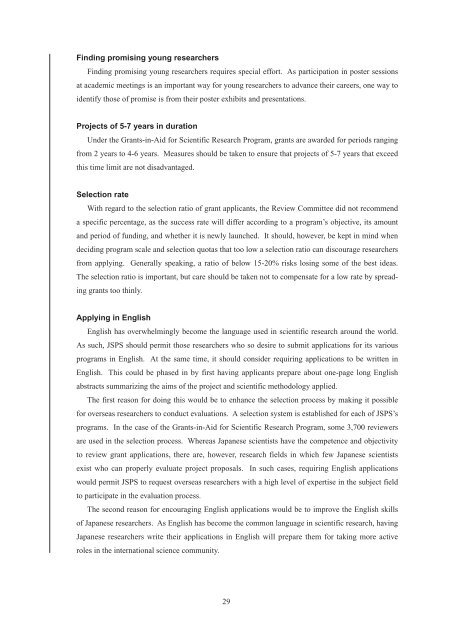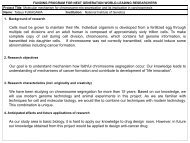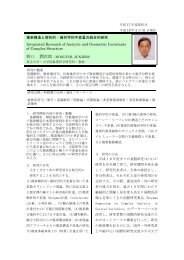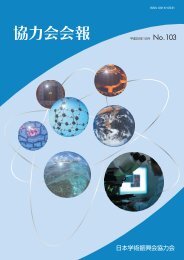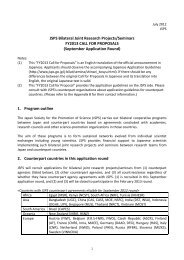"JSPS External Review Report" was issued.(PDF File 1.22MB)
"JSPS External Review Report" was issued.(PDF File 1.22MB)
"JSPS External Review Report" was issued.(PDF File 1.22MB)
You also want an ePaper? Increase the reach of your titles
YUMPU automatically turns print PDFs into web optimized ePapers that Google loves.
Finding promising young researchersFinding promising young researchers requires special effort. As participation in poster sessionsat academic meetings is an important way for young researchers to advance their careers, one way toidentify those of promise is from their poster exhibits and presentations.Projects of 5-7 years in durationUnder the Grants-in-Aid for Scientific Research Program, grants are awarded for periods rangingfrom 2 years to 4-6 years. Measures should be taken to ensure that projects of 5-7 years that exceedthis time limit are not disadvantaged.Selection rateWith regard to the selection ratio of grant applicants, the <strong>Review</strong> Committee did not recommenda specific percentage, as the success rate will differ according to a program’s objective, its amountand period of funding, and whether it is newly launched. It should, however, be kept in mind whendeciding program scale and selection quotas that too low a selection ratio can discourage researchersfrom applying. Generally speaking, a ratio of below 15-20% risks losing some of the best ideas.The selection ratio is important, but care should be taken not to compensate for a low rate by spreadinggrants too thinly.Applying in EnglishEnglish has overwhelmingly become the language used in scientific research around the world.As such, <strong>JSPS</strong> should permit those researchers who so desire to submit applications for its variousprograms in English. At the same time, it should consider requiring applications to be written inEnglish. This could be phased in by first having applicants prepare about one-page long Englishabstracts summarizing the aims of the project and scientific methodology applied.The first reason for doing this would be to enhance the selection process by making it possiblefor overseas researchers to conduct evaluations. A selection system is established for each of <strong>JSPS</strong>’sprograms. In the case of the Grants-in-Aid for Scientific Research Program, some 3,700 reviewersare used in the selection process. Whereas Japanese scientists have the competence and objectivityto review grant applications, there are, however, research fields in which few Japanese scientistsexist who can properly evaluate project proposals. In such cases, requiring English applicationswould permit <strong>JSPS</strong> to request overseas researchers with a high level of expertise in the subject fieldto participate in the evaluation process.The second reason for encouraging English applications would be to improve the English skillsof Japanese researchers. As English has become the common language in scientific research, havingJapanese researchers write their applications in English will prepare them for taking more activeroles in the international science community.29


